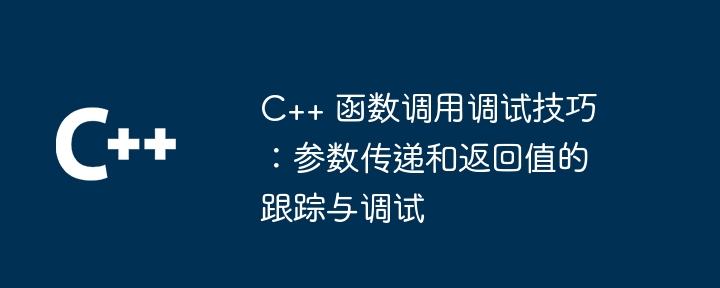 Backend Development
Backend Development
 C++
C++
 C++ function call debugging skills: tracking and debugging parameter passing and return values
C++ function call debugging skills: tracking and debugging parameter passing and return values
C++ function call debugging skills: tracking and debugging parameter passing and return values
C++ 函数调用调试技巧:参数传递:GDB 使用 call 命令,LLDB 使用 expression 命令。返回值:GDB 使用 print 命令,LLDB 使用 expr 命令。

C++ 函数调用调试技巧:参数传递和返回值的跟踪与调试
在复杂的 C++ 程序中,调试函数调用可能是一项艰巨的任务,尤其是在遇到参数传递或返回值问题时。以下是使用 GDB 和 LLDB 等调试工具跟踪和调试函数调用参数和返回值的技巧:
参数传递:
-
GDB: 使用
gdb的call命令,并传递参数作为字符串,例如:(gdb) call myFunction("Hello", 10)Copy after login LLDB: 使用
lldb的expression命令,并传递参数作为表达式,例如:(lldb) expression myFunction("Hello", 10)Copy after login
返回值:
GDB: 使用
gdb的print命令打印返回值,例如:(gdb) print myFunction("Hello", 10)Copy after loginLLDB: 使用
lldb的expr命令打印返回值,例如:(lldb) expr myFunction("Hello", 10)Copy after login
实战案例:
考虑以下 C++ 函数:
int myFunction(const char* str, int number) {
std::cout << "String: " << str << ", ";
std::cout << "Number: " << number << std::endl;
return number + 10;
}使用 GDB 调试:
(gdb) call myFunction("Hello", 10)
String: Hello, Number: 10
= 20使用 LLDB 调试:
(lldb) expression myFunction("Hello", 10)
(int) $0 = 20以上示例演示了如何使用 GDB 和 LLDB 跟踪和调试函数调用中的参数传递和返回值。通过使用这些技巧,你可以快速定位并解决代码中的问题。
The above is the detailed content of C++ function call debugging skills: tracking and debugging parameter passing and return values. For more information, please follow other related articles on the PHP Chinese website!

Hot AI Tools

Undresser.AI Undress
AI-powered app for creating realistic nude photos

AI Clothes Remover
Online AI tool for removing clothes from photos.

Undress AI Tool
Undress images for free

Clothoff.io
AI clothes remover

AI Hentai Generator
Generate AI Hentai for free.

Hot Article

Hot Tools

Notepad++7.3.1
Easy-to-use and free code editor

SublimeText3 Chinese version
Chinese version, very easy to use

Zend Studio 13.0.1
Powerful PHP integrated development environment

Dreamweaver CS6
Visual web development tools

SublimeText3 Mac version
God-level code editing software (SublimeText3)

Hot Topics
 How to implement the Strategy Design Pattern in C++?
Jun 06, 2024 pm 04:16 PM
How to implement the Strategy Design Pattern in C++?
Jun 06, 2024 pm 04:16 PM
The steps to implement the strategy pattern in C++ are as follows: define the strategy interface and declare the methods that need to be executed. Create specific strategy classes, implement the interface respectively and provide different algorithms. Use a context class to hold a reference to a concrete strategy class and perform operations through it.
 Similarities and Differences between Golang and C++
Jun 05, 2024 pm 06:12 PM
Similarities and Differences between Golang and C++
Jun 05, 2024 pm 06:12 PM
Golang and C++ are garbage collected and manual memory management programming languages respectively, with different syntax and type systems. Golang implements concurrent programming through Goroutine, and C++ implements it through threads. Golang memory management is simple, and C++ has stronger performance. In practical cases, Golang code is simpler and C++ has obvious performance advantages.
 How to implement nested exception handling in C++?
Jun 05, 2024 pm 09:15 PM
How to implement nested exception handling in C++?
Jun 05, 2024 pm 09:15 PM
Nested exception handling is implemented in C++ through nested try-catch blocks, allowing new exceptions to be raised within the exception handler. The nested try-catch steps are as follows: 1. The outer try-catch block handles all exceptions, including those thrown by the inner exception handler. 2. The inner try-catch block handles specific types of exceptions, and if an out-of-scope exception occurs, control is given to the external exception handler.
 How to iterate over a C++ STL container?
Jun 05, 2024 pm 06:29 PM
How to iterate over a C++ STL container?
Jun 05, 2024 pm 06:29 PM
To iterate over an STL container, you can use the container's begin() and end() functions to get the iterator range: Vector: Use a for loop to iterate over the iterator range. Linked list: Use the next() member function to traverse the elements of the linked list. Mapping: Get the key-value iterator and use a for loop to traverse it.
 How to copy files using C++?
Jun 05, 2024 pm 02:44 PM
How to copy files using C++?
Jun 05, 2024 pm 02:44 PM
How to copy files in C++? Use std::ifstream and std::ofstream streams to read the source file, write to the destination file, and close the stream. 1. Create new streams of source and target files. 2. Check whether the stream is opened successfully. 3. Copy the file data block by block and close the stream to release resources.
 How to use C++ template inheritance?
Jun 06, 2024 am 10:33 AM
How to use C++ template inheritance?
Jun 06, 2024 am 10:33 AM
C++ template inheritance allows template-derived classes to reuse the code and functionality of the base class template, which is suitable for creating classes with the same core logic but different specific behaviors. The template inheritance syntax is: templateclassDerived:publicBase{}. Example: templateclassBase{};templateclassDerived:publicBase{};. Practical case: Created the derived class Derived, inherited the counting function of the base class Base, and added the printCount method to print the current count.
 What are the common applications of C++ templates in actual development?
Jun 05, 2024 pm 05:09 PM
What are the common applications of C++ templates in actual development?
Jun 05, 2024 pm 05:09 PM
C++ templates are widely used in actual development, including container class templates, algorithm templates, generic function templates and metaprogramming templates. For example, a generic sorting algorithm can sort arrays of different types of data.
 How to handle cross-thread C++ exceptions?
Jun 06, 2024 am 10:44 AM
How to handle cross-thread C++ exceptions?
Jun 06, 2024 am 10:44 AM
In multi-threaded C++, exception handling is implemented through the std::promise and std::future mechanisms: use the promise object to record the exception in the thread that throws the exception. Use a future object to check for exceptions in the thread that receives the exception. Practical cases show how to use promises and futures to catch and handle exceptions in different threads.





